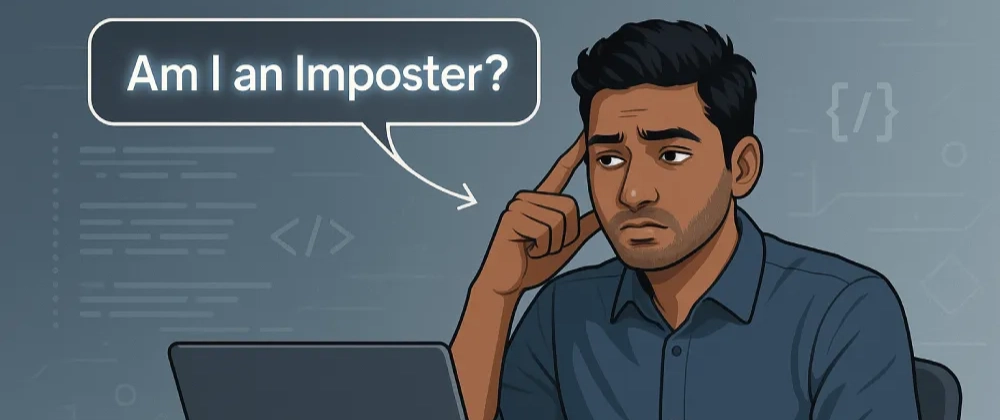Ever feel like you’re just pretending to be a developer?
Like, any moment now, someone’s going to expose you as a fraud?
I’m a fraud in every sense of the word.
Despite coding for a while — maybe even professionally — building various apps…
Yet you still feel like an imposter?
Before you go any further, I just want to say please support my original content: I have also published this story on my LinkedIn, support there as well. Your support will be appreciated.
Click the link: Am I an Imposter?
Guess what?
Even though it might not make much sense, almost every developer feels the same way.
Oh, really? Yeah.
If you’re concerned that you’re Googling as often now as when you started programming — or perhaps even more —
I’m sorry to break it to you, but you’re as normal as it gets.
Forgetting syntax daily,
making mistakes like they’re part of the job description…
That’s exactly what we do.
And how could we not?
With all the information we learn continuously, and the countless hours spent debugging,
how can we expect to memorize everything?
Each year, frameworks evolve,
new tech shows up,
project requirements shift.
It’s a constant learning curve,
and feeling this way is just part of the process.
I feel much better now.
When you have thoughts like
“I don’t know if what I’m doing makes sense”
or
“I feel stuck on this problem”
take a practical approach.
Break down the issue.
If you think I need to be a better developer,
ask yourself: what does better actually mean?
If you’re new:
➤ Pick the coding area you want to focus on (web dev, mobile apps, etc.)
➤ Choose the right programming language
➤ Find a roadmap and stick to it
if you’re already working on something and feel like you’re not good enough:
➤ figure out what’s specifically giving you trouble (DB connections? Deployment? Logic?)
➤ work backward and tackle that piece.
This helps me personally.
It’s way less discouraging — and definitely less depressing.
At the very least… that might work.
So, if you can write code, make mistakes, Google the solution, and start over again —
you’re doing exactly what we all do.
Not only are you becoming better at Googling (which is a real skill btw)
but more importantly,
you’re growing as a developer.
👏 Like if this story connected with you!
🔖 Highlight the lines that inspired you the most.
💾 Save this post to revisit when you need a boost.
👥 Follow me for more content like this.
💬 Share your thoughts in the comments — let’s talk about it! 👇
Stay connected with me on my other platforms:
📍 Find me on: LinkedIn | Medium | Bluesky | Hackernoon




Top comments (8)
I really agree with the writer about how developers are sharing the same feeling of imposter syndrome. It's something many of us face, not just in tech, but across different industries and even in life, such as in family dynamics. Personally, I’ve gone through this too. For me, overcoming this syndrome meant laying the groundwork to build confidence both inside and outside of myself.
The internal confidence comes from how we think about ourselves. Our thoughts drive us, and developing a mindset that’s positive and confident makes a huge difference. External confidence, on the other hand, is built on experience and success. Through facing failures and going through the work process, we gather real confidence, not just a false sense of arrogance.
Sometimes, it’s easy to look on someone who seems to have it all together and think they never feel insecure. But in reality, many of us have moments where we feel blacked out, uncertain about what we’re doing. And when we push through, we often find that what seemed overwhelming turned out to be manageable in the end.
I’ve also been caught off-guard by how many professionals feel the same way. It’s comforting to know that feeling like an imposter is a shared experience — we’re all learning, growing, and building confidence together.
Googling, Duckduckgoing and ChatGPTing!
We all rely on Google/AI/stack overflow for coding. It helps and makes us learn new way of solving a problem.
What makes one developer better than others is the ability to know where and what to search in Google/AI to solve a problem.
Also, to choose between the right solution among other garbage ones, cause the internet is full of non functional solutions and only a few original solutions.
Read this if you need the reminder that you are not alone.
Googling is so 2024 >_< ♊️
Absolutely, now developers ask the AI first in case of difficulty. That is why Google dying slowly.
In other hands, AI do the searches on search engines for the reference.
The moment you complete an entire project with AI without knowing the exerct thing you have done to solve the problem...there you go, you'll can boast of entitlement of the work but deeply, you're just an imposter.
I really appreciated what the original author shared in the article, and I liked your comment as well.
There’s a lot of code out there just like you described. It’s unsecure, unmaintainable, and impossible to refactor or debug by anyone associated with it.
That’s exactly why skilled developers will always be in demand.